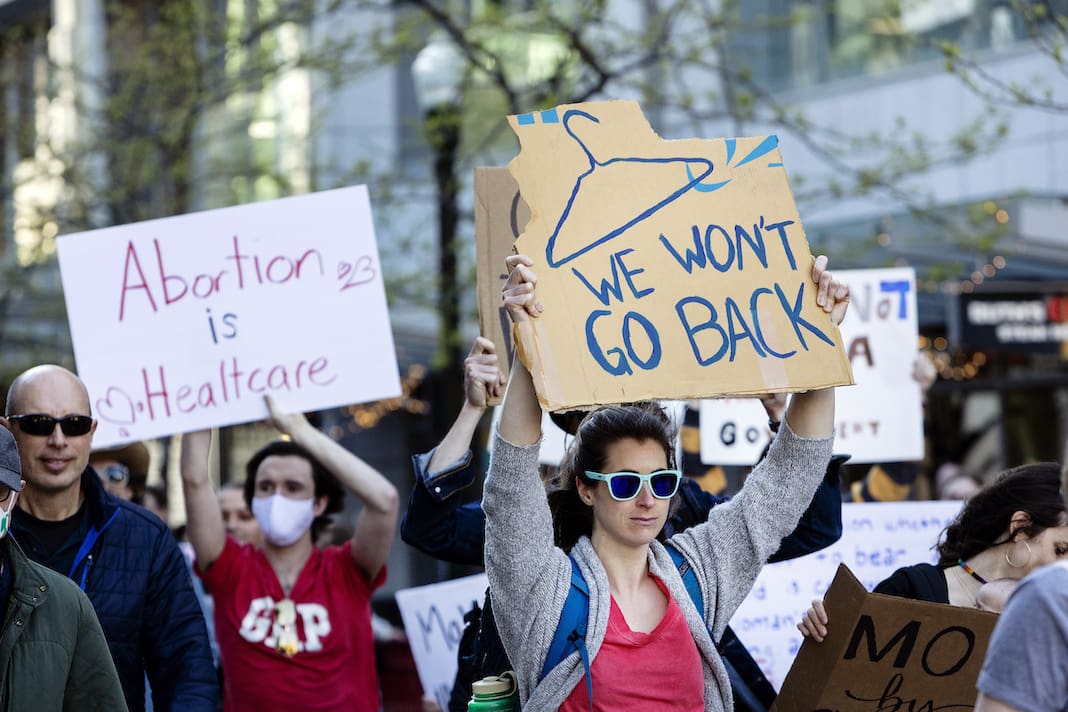Supreme Court's conservative justices sidestep facts in abortion case challenging Roe
Justice Amy Coney Barrett doesn’t seem concerned with the demands and risks of pregnancy.

On Wednesday, the U.S. Supreme Court heard arguments in Dobbs v. Jackson Women’s Health, the case of Mississippi’s 15-week previability abortion ban. Press coverage seems to have almost unanimously concluded that the Court will take the opportunity to undo one of the central tenets of Roe v. Wade: fetal viability as a determinant of when an abortion can be legally performed.
What that will leave isn’t clear. What was clear, however, is that conservative members of the court don’t have a meaningful commitment to protecting maternal health.
Take, for example, Justice Amy Coney Barrett’s fixation on “safe haven” laws, which allow a parent to surrender a child after birth without facing any child abandonment charges or other criminal liability.
Barrett, questioning attorney Julie Rikelman, who represented Jackson Women’s Health, Mississippi’s lone abortion clinic, said that the clinic’s brief and other abortion rights amicus briefs “focus on the ways in which forced parenting, forced motherhood, would hinder women’s access to the workplace and to equal opportunities” and on the “consequences of parenting and the obligations of motherhood that flow from pregnancy.” Barrett then went on to ask, “Why don’t the safe haven laws take care of that problem?”
Rikelman explained some relatively basic biological facts to Justice Barrett, noting that pregnancy “imposes unique physical demands and risks on women.” Rikelman also told the justice that, in Mississippi, “those risks are alarmingly high.”
Rikelman then cited a statistic that is familiar to reproductive health advocates: “It’s 75 times more dangerous to give birth in Mississippi … than it is to have a pre-viability abortion, and those risks are disproportionately threatening the lives of women of color.”
Like many other states that are working to ban abortion, Mississippi is one of the toughest places in America to be pregnant. The state’s maternal mortality rate has consistently been high,, although this information is tough to fully quantify because the last official reporting the state did covers only the period from 2013-2016. That data shows that Mississippi has the 15th-highest maternal mortality rate in the country. Furthermore, while there were 22.1 maternal deaths per 100,000 live births in Mississippi in that time period, the rate for Black women was 51.9, or more than double the overall rate.
In part, this occurs because postpartum care is so poor in the state. Mississippi recently refused to allow a Medicaid expansion that would have extended coverage for postpartum care for the many life-threatening or fatal pregnancy-related complications that happen after birth.
Mississippi is also a dangerous place to be a baby. In the United States, the infant mortality rate is 5.6 deaths per 1,000 live births. In Mississippi, it’s 9.1, or nearly double the national rate. The preterm birth rate is 10.1 per 100 live births nationwide, but in Mississippi that jumps to 14.2, with Black people being 44% more likely to have a preterm birth.
Barrett brought up the forced-birth option again with U.S. Solicitor General Elizabeth Prelogar, arguing on behalf of the United States against Mississippi’s law. Yet again, Barrett approvingly pushed Mississippi’s argument that as long as you don’t need to actually deal with parenting a child and can give it away, there’s no burden in having to continue a pregnancy. Prelogar explained that there is more to pregnancy than simply giving up a baby at the end, noting, “I think the state is wrong about that. And I — I think where the analysis goes wrong in reliance on those safe haven laws is overlooking the consequences of forcing a woman, upon her, the choice of having to decide whether to give a child up for adoption. That itself is its own monumental decision for her.”
In the end, Barrett’s suggestion that people simply carry a pregnancy to term and then give up a child overlooks the emotional and physical health consequences of pregnancy. Further, it explicitly ignores the wealth of information out of Mississippi showing that pregnancy is especially dangerous there.
It appears quite likely that abortion rights will be severely restricted once the Supreme Court decides this case. However, it doesn’t appear at all likely that the conservative justices on the court know or care what the future looks like for pregnant people when that happens.
Published with permission of The American Independent Foundation.
Recommended

Trump leaves door open to banning medication abortion nationwide
Donald Trump is planning to release more details in the weeks ahead about how his administration would regulate access to medication abortion, according to comments he made during a lengthy interview with Time magazine published Tuesday.
By Jennifer Shutt, States Newsroom - April 30, 2024
Ohio doctors fear effects of emergency abortion care case set to go before U.S. Supreme Court
A federal law that allows emergency departments to treat patients without regard to their ability to pay will be under U.S. Supreme Court scrutiny this week, and Ohio doctors are concerned about the case’s local impact on emergency abortion care.
By Susan Tebben, Ohio Capital Journal - April 23, 2024
Biden on abortion rights: President expects to give speech Tuesday on new Florida 6-week ban
‘Having the president of the United States speaking out loud and with confidence about abortion access is a great thing’
By Mitch Perry, Florida Phoenix - April 22, 2024








































































